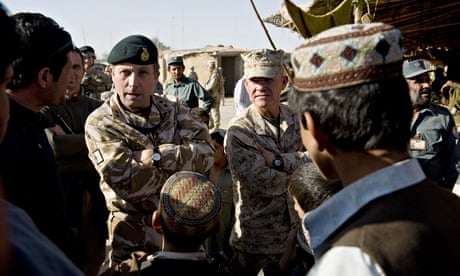New head of army plans to cut top brass
• Emphasis on non-violent warfare
 Nick Carter will have to persuade the government about the army's value. Photograph: Manpreet Romana/AFP/Getty Images
Nick Carter will have to persuade the government about the army's value. Photograph: Manpreet Romana/AFP/Getty Images
Richard Norton-Taylor Monday 2 February 2015 15.41 GMT
After the huge mistakes in Iraq and Afghanistan, and confronted now by new threats amid extraordinary geopolitical shifts, senior British army officers under the incoming chief of the general staff, Sir Nick Carter, are planning potentially far-reaching reforms.
An eyecatching centrepiece is the formation of the 77th Brigade, inspired by the Chindits, the guerrilla unit which operated behind enemy lines during the Burma campaign against the Japanese during the second world war.
"The brigade consists of more than just traditional capabilities. It is an organisation that sits at the heart of trying to operate smarter". said Carter.
Russian activities in Ukraine have confirmed what was becoming increasingly obvious in Iraq and Afghanistan but which Britain's military establishment seemed slow to understand – namely, that the character of war is changing.
"One of the follies of our current age has been an unmatched ambition to change the world without bothering to understand it first", said General Sir Nick Houghton, in his first annual lecture as chief of the defence staff in 2013.
His refreshing and pointed aside is quoted in High Command, by Christopher Elliott, former director of military operations in the Ministry of Defence, the latest book (published by Hurst) on the political and military follies of the Iraq and Afghanistan Wars.
The emphasis now is not so much on military force but "political warfare", including psychological operations (psyops), deception, and media operations (hence the numerous references in recent stories by defence journalists to "facebook warriors").
The new Chindit brigade, consisting of reservists and civilian specialists as well as regular troops, is designed to help the army win non-kinetic battles in an age of internet warfare and cyber attacks. The unit would "play a key part in enabling the UK to fight in the information age", said an army spokesman.
Advertisement
The comparison with the exotic Chindit force is appropiate mainly in that it was set up as a long range penetration force, sharing some of the characteristics of the SAS. The original Chindits (named after the Chinthe, fierce lion-like creatures that stood guard at Burmese temples) suffered from a high casualty rate from disease and sheer exhaustion, as a result of the extreme physical effort involved in disrupting communications and supply routes.
Disrupting communications and spreading and countering sophisticated propaganda will be the new Chindits' priorities but the environment they will operate in will be very different from that of the Burmese jungle.
1,500 or so new Chindits, who will based near Newbury in Berkshire, could provide just the kind of help Ukraine was asking for on Monday – jamming the communications of pro-Russian, and Russian, forces in the east of the country.
Carter and his advisers, meanwhile, are planning to streamline the army's hierarchy, culling perhaps a third of its 500 colonels and 200 brigadiers and generals. No senior officers were sacked over Iraq or Afghanistan.
The idea is to change the culture of the top brass, to encourage individuals who have demonstrated their ability – and confidence – to understand the new world, of geopolitics as well as of conflict.
It is noteworthy, perhaps, that the planned shakeup in the British army, in many ways one of Britain's most conservative institutions, comes at a time when Vladimir Putin's Russia is investing heavily in unconventional warfare, trying to undermine the Nato alliance by supporting the National Front in France, and such nationalists as Hungary's Jobbik party, and hoping to develop close relations with the new government in Greece.
Britain's defence establishment, as well as its political leadership, will have to get used to a new security and geopolitical landscape, one in which nationalists and practitioners of unconventional warfare – sometimes separately, sometimes together – regard international institutions, both Nato and the EU, both based in Brussels, as an enemy.
http://www.theguardian.com/uk-news/defence-and-security-blog/2015/feb/02/british-army-ukraine

Δεν υπάρχουν σχόλια:
Δημοσίευση σχολίου